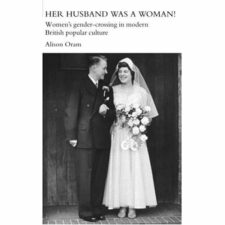Why do some women receive publicity and public recognition of their achievements and others remain completely ignored? This is the case of Ellen Wilkinson MP, discussed in an earlier blog, and also her friends the birth control pioneers.
There was an increasing recognition that the franchise on its own did not provide all the answers to women’s condition. On 4 May 1923, just five years after the first women gained the vote , Mrs M.B. Cooke wrote in the Women’s Leader, ‘What does it avail a woman that she has the franchise if she cannot call her body her body her own, and is at the mercy of her husband’s desires and wishes’. In 1921 Marie Stopes started the country’s first birth control clinic in Holloway Road, London and the Society for the Provision of Birth Control Clinics used volunteers to set up clinics in the major towns of England and Scotland.
‘Large Family’
30th June 1914: Mr and Mrs Terry of Greenwich, London, with part of their family of nineteen children. (Photo by Topical Press Agency/Getty Images)
This required courage and commitment on the part of the volunteers. Although sympathetic female doctors were employed, the volunteers had to find premises, order supplies and turn up each week to complete records. Most importantly the volunteers had to be able to relate to the working class mothers who were often nervous and apprehensive. In an interview with me, Charis Frankenburg’s daughter said of her mother, co-founder of the Manchester and Salford Clinic, ‘Mother would talk to anyone’. In the 1980’s one of the clinic’s clients praised Charis in a tape-recorded interview with Manchester Studies. This was remarkable as she had earlier taken part in a strike at Charis’ husband’s factory.
It was difficult for the women to find suitable premises as they had to be convenient for their clients. Charis Frankenburg used her contacts to find the top floor of a pastry shop in Salford High Street. This had the advantage that women could come and go without being identified. Even the name ‘Mothers’ Clinic’ was discrete.
There was opposition to birth control from the Catholic Church and initially from the Church of England hierarchy. Unfortunately in Salford the shop was directly opposite the Catholic Cathedral and the women volunteers had to face violence from enraged Catholic youths. Bishop Henshaw preached against the clinic from the pulpit but this had unintended consequences. When clients were asked how they heard about the clinic they replied, ‘They told us in Church not to come.’ Marie Stopes carried out a high profile campaign against the Catholic Church’s condemnation of birth control. One result was a Catholic woman being convicted of arson because she burnt down Stopes’ mobile birth control caravan.
The birth control pioneers wanted to make themselves redundant .They demanded that an affordable, comprehensive contraceptive service should be provided by the State with equal access throughout the country. They lobbied the main political parties to make this part of their agendas. The rank and file members were sympathetic but the Labour Party leadership, while being sympathetic, considered birth control an electoral liability in Catholic constituencies. Ellen Wilkinson at first made a public commitment to the birth control cause, but in 1930 she wrote to her friend Dora Russell that she could no longer speak out publicly as she was a single woman. It was not till 1974 that red-headed Labour politician, Barbara Castle, Secretary of State for Social Services and Health, made family planning services free as part of the National Health Service.
A great deal of the work of the birth control pioneers was time consuming and at times dangerous, but it was not headline-making. The volunteers’ commitment is shown in over a hundred profiles of ordinary birth control volunteers, and this is an attempt to tell the story of unrecognised women such as Hilda Shufflebotham, Fenella Paton and Charis Frankenburg.
Clare Debenham (c) February 2014
Clare Debenham is a tutor in the Department of Politics at Manchester University. She is the author of Birth Control and the Rights of Women: Post Suffrage Feminism in the Twentieth Century ( I.B. Tauris, January 2014). For more details go to www.ibtauris.com/birth-control-and-the-rights-of-women

